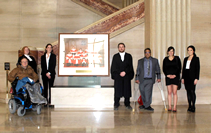Act Now

Empower U: Learn to Access Your Disability Rights Training on Canadian Human Rights, the Convention on the Rights of Persons with Disabilities (CRPD) and its Optional Protocol (OP) training aims to increase awareness of how to address discrimination using more familiar Canadian human rights laws such as Human Rights Codes and the newer international Convention on the Rights of Persons with Disabilities (CRPD). This is training for persons with disabilities by persons with disabilities. The training is part of a project funded by Employment and Social Development Canada and implemented by the Council of Canadians with Disabilities (CCD) in collaboration with Canadian Multicultural Disability Centre Inc. (CMDCI), Citizens With Disabilities – Ontario (CWDO), Manitoba League of Persons with Disabilities (MLPD) and National Educational Association of Disabled Students (NEADS). Read more.
Sign Up for our monthly digest
A monthly newsletter from CCD about what is happening in the community
CCD Concurs: Add Anti-Racism Pillar to Canada Health Act
Related Documents
April 17, 2024
Council of Canadians with Disabilities : 48 years strong and "On The Road to 50 Years"
March 21, 2024
Everyone has a responsibility to end racism
December 10, 2023
International Day of Human Rights
Media Release
For Immediate Release | November 13, 2020
The Council of Canadians with Disabilities (CCD), a national human rights organization of people with disabilities working for an accessible and inclusive Canada, adds its voice to the Brian Sinclair Working Group’s call for the amendment of the Canada Health Act to make anti-racism the Act’s sixth pillar. The Working Group’s call comes in the aftermath of the death of Joyce Echaquan, a member of the Manawan First Nation, who endured systemic racism at a Joliette hospital in Quebec. “In the lead-up to a January 2021 high-level Canadian meeting on addressing systemic racism in the health care system, we are speaking out in support of an anti-racism pillar for the Canada Health Act to demonstrate to Canadian decision makers the groundswell of support for the measure from all Canadians,” states Roxana Jahani Aval, Chairperson.
Systemic racism in the health care system is not a Quebec problem; it is a Canadian problem. For example, Mary Ellen Turpel-Lafond is investigating systemic racism in B.C.'s health care system.
Ms. Echaquan’s family and community have challenged Canada to address the pervasive systemic racism that prevents Indigenous and all racialized Canadians from realizing their equality and human rights as promised in Canada’s Charter of Rights and Freedoms and provincial and federal human rights legislation.
“Fast-tracking this amendment of the Canada Health Act to mandate immediate and substantive actions is necessary to address racism at all levels of the health care system. This would demonstrate to Ms. Echaquan’s community and all Canadians that the federal government is actively and without delay developing the policy mechanisms to begin to address systemic racism which is a cause of inequitable health care outcomes for racialized people in Canada,” states Heather Walkus, First Vice-Chair. “Permanent, episodic or temporary disablement can be a consequence of this discrimination.”
“We call on all social justice, human rights, and disability organizations and all Canadians to add their voices to the call for addition of an anti-racism pillar to the Canada Health Act,” states Chair Roxana Jahani Aval.
Supporters can also sign the Brian Sinclair Working Group’s Open Letter, which elaborates the call for the anti-racism pillar. (The Open Letter can be viewed at https://docs.google.com/forms/d/e/1FAIpQLScR0UVbfWdKkDaM39HHLUbytNK-vOsVryuBki6Pn4eUpoUhUA/viewform)
-30-
For more information contact:
Roxana Jahani Aval, Chair, Email: rjaneads@gmail.com, Tel:416-949-3662
Heather Walkus, First Vice Chairperson, Email: letstalk@hooh.ca, Tel: 250-501-1112
About CCD
CCD is a national human rights organization of people with disabilities working for an inclusive and accessible Canada.
Mission
The Council of Canadians with Disabilities (CCD) is a social justice organization of people with all disabilities that champions the voices of people with disabilities, advocating an inclusive and accessible Canada, where people with disabilities have full realization of their human rights, as described in the UN Convention on the Rights of Persons with Disabilities.
Mandate
The Council of Canadians with Disabilities (CCD) unites advocacy organizations of people with disabilities to defend and extend human rights for persons with disabilities through public education, advocacy, intervention in litigation, research, consultation and partnerships. CCD amplifies the expertise of our partners by acting as a convening body and consensus builder.

Some members of the CCD team at the Supreme Court of Canada on April 25, 2018 to intervene in S.A. v. Metro Vancouver Housing Corporation. (L. to R. Bob Brown, CCD Human Rights Committee member, Dianne Wintermute, legal counsel (ARCH), Dahlia James, a second year JD candidate at U. of Ottawa and Prof. Ravi Malhotra’s Research Assistant and Luke Reid, legal counsel (ARCH) , and Prof. Ravi Malhotra, a member of the Human Rights Committee, Prof. Anne Levesque, Chair of the Human Rights Committee, and Erin Carr, a second year JD candidate.
The Latimer Case
The Latimer case directly concerned the rights of persons with disabilities. Mr. Latimer's view was that a parent has the right to kill a child with a disability if that parent decides the child's quality of life no longer warrants its continuation. CCD explained to the court and to the public how that view threatens the lives of people with disabilities and is deeply offensive to fundamental constitutional values. Learn more.
